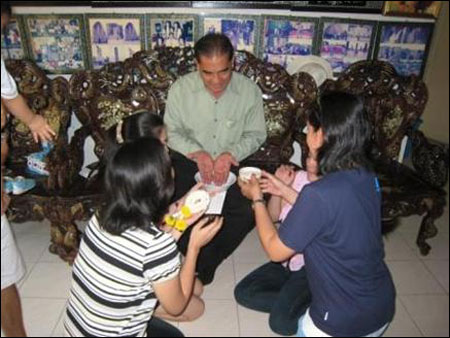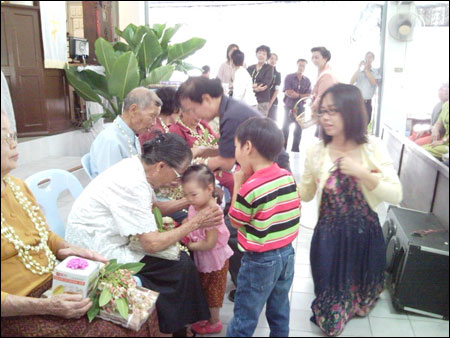Blessing Our Descendants#1
The meaning of vara is progress and happiness.
When we reach old age, blessing our descendants becomes an important duty among our many obligations. However, our blessings will be revered only if we do it moderately and properly depending on our seniority and qualifications. Studying the criteria of how our ancestors blessed their descendants and instilled them with obedience, raising them to become good citizens is of great benefit to us. Their principles give us clear guidance, which can be adapted to our own situation when we reach old age.
What is a blessing?
Blessing is called vara in the Pali language.
The meaning of vara is progress and happiness.
A blessing means the act of giving the very best.
Therefore, when the elderly give a blessing to their descendants, it is equivalent to wishing them the very best.
The Significance of the Blessing
Many may not know that blessing descendants has been a tradition of Thai life since ancient times. It is a routing that a family practiced before going to sleep. Parents would bring their children to pay respect to the grandparents every night. Then the grandparents would summarize all the good deeds they had done that day in a blessing for their grandchildren. In doing so, the children would be instilled with morals and would learn from their grandparents’ virtues. Such acts transferred good deeds and virtues and the children learned to believe in the Law of Kamma.
In the past, people in Thai society lived more peacefully. They had fewer problems than in today’s society because most families engaged in this nightly family routine, creating a harmonious environment.
The elderly represent the heart of the whole family. If their voices that speak of Dhamma, encouragement or caution are absent, it would seem like the family’s heart stops functioning. At the same time, the family would not be united. Later, conflict, loneliness, depression, and discouragement would arise in the family. The family’s warmth would gradually fall away and them come to an end. Eventually, the only sounds on ewould hear from the family would be obscenities, quarrels, and the noise produced by alcohol drinking and gambling.
A family that understands the importance of a daily blessing by the elderly will teach their children to be well acquainted with paying homage and asking their parents and grandparents for blessings every night before bed. In cases where the grandparents have passed away, the parents would teach their children to pay respect in front of their grandparents’ portraits instead. And they would take on the grandparents’ role in bringing up their own virtues and good deeds so they could be good role models for their own children.
Nowadays, such a routine has departed from Thai families; it has become a cause for family problems such as the increasing rate of divorce, the neglect of elderly parents, etc. In addition, some problems are caused by couples who separated themselves from their extended family to become a nuclear family. The only members of the family unit are the parents and children. As a result, the children seldom receive blessings from their grandparents. When parents fail to realize this and do not take o the grandparents’ role for their own children, conflicts consequently arise. Some cases are even worse because individual family members live on their own in the same house. This ruins the relationship between parent and child, while they remain ignorant of the problem’s root.
If you are part of a nuclear family that has not practiced this tradition, as parents you must discuss this topic. You should ask yourself questions like, “Do you want your family members to live on their own or do you want to transform your family with the honorable Thai tradition that can bring about family unity?”
When your parents live far from your family, you must take their place. The suggestion is that the mother should bring the children to pay homage to and ask for a blessing from the father, the head of household first; them homage should be paid to the mother. Practicing this before going to sleep creates a warmhearted family. It is a guarantee that your family unity will be stable. When you reach old-age, you will not be neglected because you have taught your adult children to be grateful since their parents’ blessing. And although they are grown, they will still pay respect to you and their grandparents in the same way. They believe that you have been good providers because they have always gained valuable teachings from you.
A blessing means the act of giving the very best.
How does one create the very best in oneself?
The reader can now appreciate the meaning and significance of a “blessing.” Now we came to the interesting question of how a person can develop his/her best qualities.
In accordance with Buddhist principles, the human “mind” has characteristics that differ from other living beings in this world. They are:
1) The mind can be trained to have a higher quality.
2) The mind can be rid of evil.
3) The mind can accrue purity.
According to these characteristics, if the human mind accumulates only good deeds, it will become blissful and powerful. On the contrary, if it accumulates only evil deeds, it will become dark and evil. Because each individual is constantly accruing both good and evil deeds, one’s mind is not completely pure or dark. If it is wholly pure, the person would have an afterlife n a heavenly realm or attain enlightenment and enter Nibbana (Nirvana). If the mind is totally dark, the person would go to a hell realm after death.
Because we have committed both good and evil deeds in our lives, we must correct ourselves by eliminating the evil deeds and by doing our best to perform more good deeds in this life.
The inability to develop the very best in oneself has root causes that can be divided into major three groups which, as a whole, are called defilements (Kilesa). They are:
1) Greed (or desire) – selfishness, never ending greed, and stinginess.
This includes an adult who is greedy and covets others’ possessions or a child who is selfish and steals others’ belongings.
2) Anger (or hatred) – displeasure, or taken to the extreme, one who is easily offended and causes destruction.
This includes adults who are easily irritated and angered or children who have bad tempers.
3) Ignorance (or delusions) – mistaking the wrong for the right view, and vice versa; mistaking the good for the bad, and vice versa. This ignorance causes one to possess bad, and vice versa. This ignorance causes one to possess negative thoughts, speech, and conduct.
This includes an adult who is biased, jealous, and likes to gossip about others or a child who takes drugs, intoxicants, or becomes addicted to the chemicals in paint.
These three types of defilements cause one to be incapable of developing the very best in oneself. The more defilements one harbors, the fewer noble qualities one can gain. As a result, no one wants to associate with this type of person or even care for him in sickness.
On the contrary, those who had once been selfish, angry, or jealous, and then reversed their conduct by improving themselves, will possess positive thoughts, speech, and actions. When good deeds are accumulated, bad habits will turn into positive ones and they will be creating more of the very best in themselves. Both adults and children can do this; it just takes determination and conscientious practice.
Meditation - Related Articles
" />
" />
" />
" />
" />
" />
" />
" />
" />
" />
" />
" />







